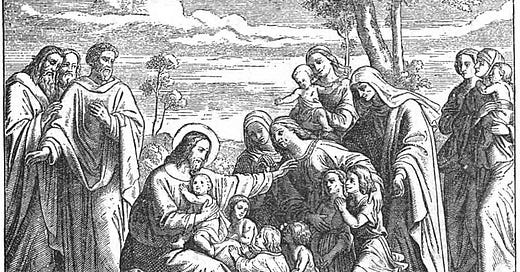Now through April 15th at Word & Song our Easter special continues with a 20% discount on all upgrades, gift, and new subscriptions. We wish you all the blessings of Eastertide.
You are in school one day, when a creature from Mars walks into your room. He turns his antennas toward the teacher and they start to vibrate and hum. That is how creatures from Mars talk, as you know.
“Are – all – these – chil-a-der-en yours?” he asks.
The teacher laughs, because she is used to creatures from Mars not knowing the simplest things in the world. “They aren’t my children,” she says. “They are my students.”
“Your se-tu-dens?”
“Yes,” she says, and asks the creature if he would like to sit in on the day’s lesson, which is about Eskimos. Creatures from Mars are interested in Eskimos, because they have a lot in common, such as the way they dress.
But I wonder what would have happened if the teacher had said, “These aren’t my CHILDREN. They are my DISCIPLES.” The Martian might have gotten out his portable telephone, which he keeps locked up in the ball that hangs from the end of one of his antennas, and called up the principal. “You had bet-ter come here ke-wick-e-ly,” he would hum. “Teacher thinks she is Je-sus Che-rist.” For Martians are smarter than earthlings about who is and who isn’t the Messiah.
Our Word of the Week, DISCIPLE, came into English 1,300 years ago when the Christian missionaries sailed to England to bring the gospel to the pagan Germans. Those missionaries read the Bible in Latin, and that is where they got the word: DISCIPULUS. It referred to a person who followed Jesus. After many centuries we started to use the word for a person who follows a thinker or statesman who is not the Messiah, but who may think he is, or for a person who is really influential in a certain field. So Vladimir Lenin was a DISCIPLE of Karl Marx, and that brought a lot of misery to the world. In this sense you can be a DISCIPLE of somebody who died long before you were born. The poet Lord Byron was a DISCIPLE of Alexander Pope at a time when Pope wasn’t very popular, and Byron learned from him the art of English satire.
When an English speaker hears the word DISCIPLE, then, he thinks of a grown man doing something serious. He doesn’t think of childhood. That’s unfortunate, though. The original Greek word that Latin DISCIPULUS translates is MATHETES (mah-THAY-tays), meaning somebody who has to learn things, as you do in school. It’s why we called it MATHEMATICS, from the Greek sense that dealing with numbers and lines and shapes was a kind of thing especially fit for children and young people. You don’t need a lot of experience to deal with numbers. It’s your ABC’s. Think of a DISCIPLE as someone who is learning his alphabet. Jesus is teaching his followers the ABC’s of grace.
Now, the first Christians in England didn’t always use the Old English DISCIPUL (say it, dis-SHEE-pool). More common was the great word LEORNUNGCNIHT (LAYER-nung-k-nicht – make sure you pronounce the K!) – a LEARNING-KNIGHT. Don’t think of an old man in full armor riding a horse and wielding a lance. Think of a young household servant. Being a servant comes through in another word they used to describe Peter, James, John, and the others: THEGN, pronounced THANE, a fighting man who serves his lord. If you know the story, you may think of Beowulf and his THANES, sailing to Denmark so that their leader will take on the monster Grendel. In the German mind, Jesus was surrounded by THANES. That word too has a sense of youth to it. Old Saxon THEGAN meant not just a soldier, but a follower or a BOY. The distant cousin in Greek, TEKNON, meant a CHILD, the child you have brought to birth. That is why Mary is called the THEO-TOKOS, the God-bearer, the woman who bore to us the child who is God.
But if you’re in Germany right now, you won’t call the followers of Jesus DISCIPLES or THANES. You’ll call them JUNGEN (YOONG-en). The disciples are YOUNGSTERS. They may be old and their knees may wobble, but to Jesus they are YOUNGSTERS, children in elementary school all over again. If they are good DISCIPLES they will show all the fresh enthusiasm and delight of the true young student, who can hardly wait to pass on to others what he has learned.
And that gives us another way to think of what Jesus means when he says, “Unless you become as little children, you shall not enter the kingdom of God.” We must be like a child who takes a book to his father and asks him to read him a story. “Teach us to pray,” said the DISCIPLES to Jesus. We don’t know anything at all if we don’t know how to pray. And Jesus opens the book for us, and brings dark and mysterious things into the light.
Word & Song is an online magazine devoted to reclaiming the good, the beautiful, and the true. We publish six essays each week, on words, classic hymn, poems, films, and popular songs, as well a weekly podcast, alternately Poetry Aloud or Anthony Esolen Speaks. To support this project, please join us as a free or paid subscriber.
Listen to this episode with a 7-day free trial
Subscribe to Word & Song by Anthony Esolen to listen to this post and get 7 days of free access to the full post archives.














